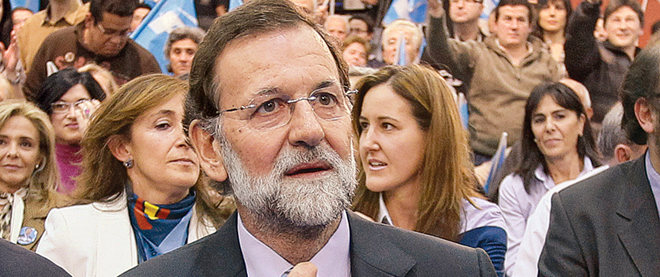Spain’s Mariano Rajoy isn’t popular—but he’s way ahead
Rajoy is poised to win the election, despite inspiring confidence in just 4.5 per cent of Spaniards
Cesar Manso/AFP/Getty Images
Share

Spaniards think he’s boring, but anger over Spain’s economic crisis is expected to propel opposition leader Mariano Rajoy to victory in the country’s Nov. 20 election.
Rajoy’s conservative People’s Party is expected to win a landslide parliamentary majority with 47.6 per cent of the votes, according to a Nov. 13 poll published in Spain’s centre-right El Mundo newspaper. The second-place Socialist Party, led by Alfredo Pérez Rubalcaba, trailed the People’s Party by 17.8 percentage points, with a predicted 29.8 per cent. Various polls also widely declared Rajoy the winner of a Nov. 7 televised debate against Rubalcaba, the sole face-to-face exchange of the campaign.
Rajoy, 56, and Rubalcaba, 60, squared off on how to solve Spain’s debt crisis and kick-start its stagnant economy. Rubalcaba accused Rajoy of hiding plans to cut benefits and pensions to curb Spain’s growing deficit: “If you tell people the plans you have in your head, not even your own party members will vote for you,” he said. But Rubalcaba’s interrogation did little to stop Rajoy, who rebuffed his rival by evoking the spectre of Spain’s debt crisis: “I think Spain needs a change and needs it urgently.”
Rajoy’s strategy seems to be working. Support for outgoing Socialist Prime Minister Jose Luis Rodriguez Zapatero, who came to power in 2004, has waned in recent months amidst Spain’s 15-year record high unemployment rate of 21.5 per cent—more than twice the European Union average—and the deepest austerity measures implemented in 30 years. Zapatero called the snap election four months ahead of schedule and announced he would not run again, paving the way for Rajoy’s conservative policies to capitalize on the public’s desire to punish the ruling government. The election date itself is significant: Nov. 20 will mark 30 years since the death of Spanish general Francisco Franco, the controversial fascist head of state known for his suppression of political dissidents.
Rajoy’s ascent to the top of Spain’s political echelons has been largely quiet and unassuming. Born in Santiago de Compostela, the capital of Spain’s autonomous Galicia region, he joined the civil service at 24 and started his political career as a deputy in the Galician Parliament. He served as culture, education and interior ministers under Zapatero’s predecessor, the former People’s Party leader José María Aznar, before being named deputy prime minister in 2000.
His success is equally surprising, given that he isn’t particularly popular. Described as “bespectacled, bearded and boring” by the Guardian, Rajoy is maligned by critics as an uncharismatic politician, and was chastised for relying heavily on his notes throughout most of the televised debate. Rajoy inspires “no confidence” among 39.7 per cent of those polled in a Nov. 4 survey by the Spanish state-run Centre for Sociological Research, compared with 35 per cent for Rubalcaba. But according to the poll, neither candidate is individually popular: Rubalcaba inspires “a lot of confidence” in just 5.3 per cent of those polled in the same survey, compared with 4.5 per cent for Rajoy.
Despite Rajoy’s vague policies and ambivalent popularity, political commentators say he’ll be able to bank on the Socialists’ grim economic record and Rubalcaba’s inability to distance himself from Zapatero’s government.“Rajoy is the antithesis of change,” columnist David Espinós wrote in a Nov. 10 blog post for El Periódico. “But in almost every election, the candidate who can pull off the trick of associating themselves with change, wins. And in spite of everything, Rajoy has pulled it off.”